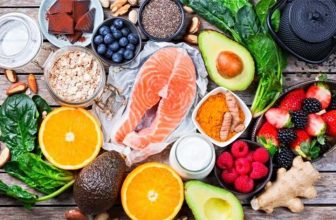
Polycystic Ovarian Syndrome (PCOS) is a chronic hormonal disease that involves reproductive hormone imbalances in women, causing excess ovarian cysts and troublesome symptoms like heavy/irregular periods, increased body hair, and painful acne. While some medications can help lessen these symptoms, diet can be a helpful tool in curbing their toll on a patient’s lifestyle. Follow on for PCOS: 4 Components of Diet You Should Change!
1. Low Glycemic Index
PCOS is a syndrome which causes a woman’s body to become resistant to insulin, thus entering a state similar to diabetes. When someone is insulin resistant, this means that they cannot process sugar in the blood the way a healthy individual would.
Following a Low Glycemic diet can prove to be very effective at managing symptoms of PCOS. Low Glycemic foods are those that don’t cause huge spikes in blood sugar. Whole grains, legumes, nuts, seeds, fruits, and starchy vegetables are all examples of Low Glycemic choices.
Avoid white breads, desserts, pastas, and other processed carbs. When your food choices are Low Glycemic, the body digests them slower and they don’t cause a disturbing spike in blood sugar. All of this means more controlled PCOS symptoms and potential weight loss as well.
2. Anti-Inflammatory Diet
When compared to women of the same weight, PCOS patients are found to have higher levels of inflammation in their bodies. When the body has lots of inflammation, it can worsen symptoms of PCOS and cause weight gain.
An Anti-Inflammatory diet consists of minimal sugary foods and drinks, evenly spaced out carbs throughout the day, fruits, unsaturated fats, lots of spices, and occasional omega-3 rich fish like salmon or tuna.
Studies have shown dramatic results in both weight loss and hormone balance when PCOS patients implement this diet!
3. Minimally Processed
The whole food movement has really picked up over the past few years in the Western world! Now, more than ever, it’s easy to buy delicious, fresh ingredients with minimal processing.
The main thing to remember when shopping for a PCOS-conscious diet is, the less processing, the better! This means avoiding bleached and refined carbs, pre-prepared meals, packaged snacks, or fast foods. Not only do these products spike insulin and inflammation, but they can cause secondary comorbidities related to PCOS, like hypertension and diabetes.
Eating whole foods doesn’t have to be boring, though! There are so many creative ways to incorporate tons of fresh nutrients into a delicious bite, like the super-simple smoothie bowl above!
4. Ditch the Meat
There are so many benefits of going vegetarian/vegan and cutting meat out of your diet; curbing PCOS symptoms is just another one to add to the list! A plant-based diet is great for PCOS because it’s high in fiber and packed with nutrients like vitamin B, C, folate and magnesium which help in lowering LDL (bad) cholesterol.
Additionally, plant-based diets (especially vegan diets) are easy on the digestive system and can create healthy gut flora. Not to mention, removing meat from the diet decreases inflammation, acidity, balances hormones, and helps control insulin levels – all heavy components in PCOS!
Facing the diagnosis of PCOS can be overwhelming, but with a few simple changes to diet, many symptoms can be controlled! Do you or a loved one suffer from PCOS? What kind of diet do you find helpful? Do share below and join the conversation on Facebook, Twitter & Instagram!









